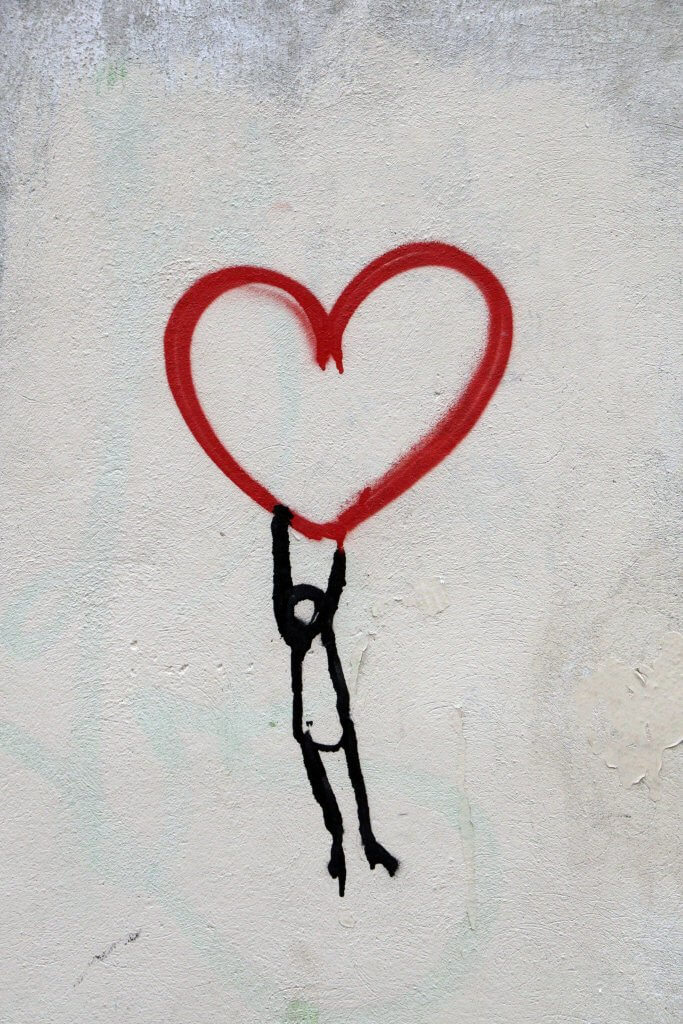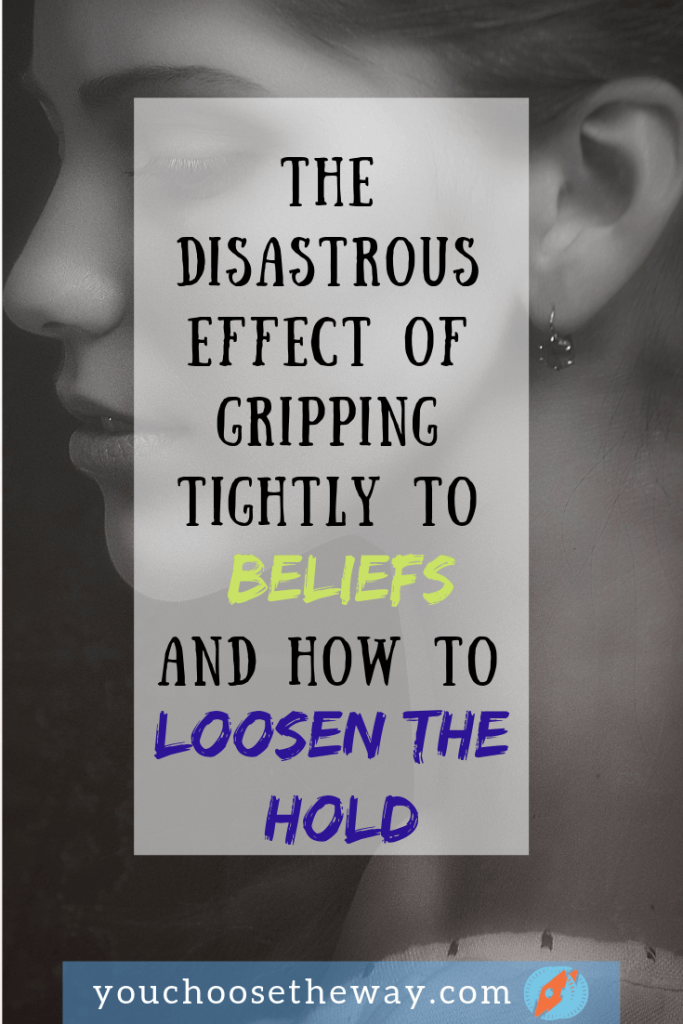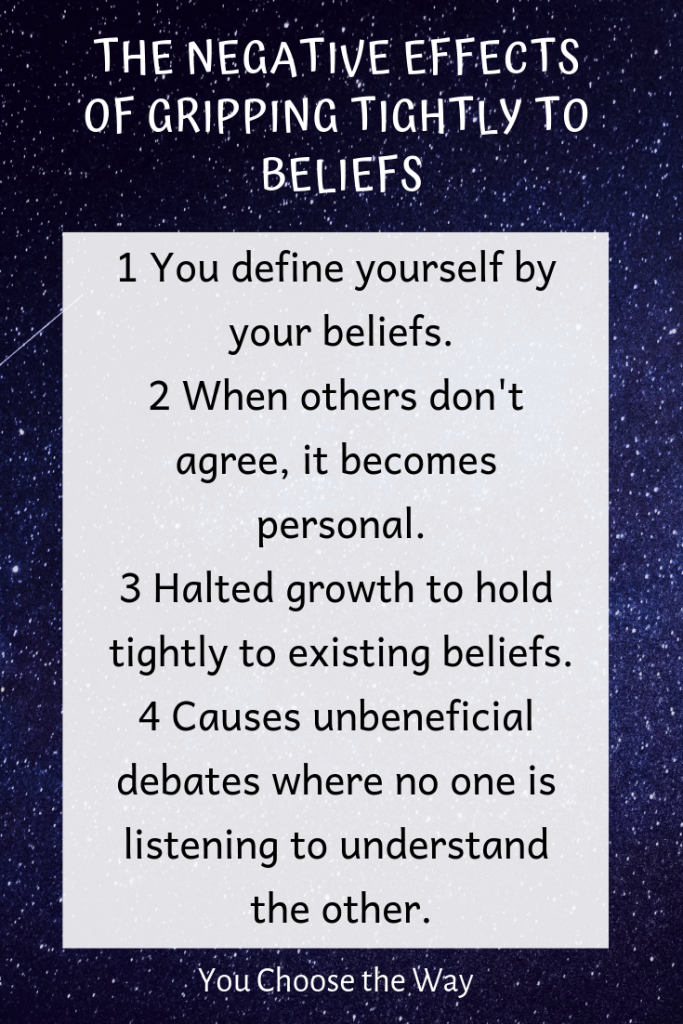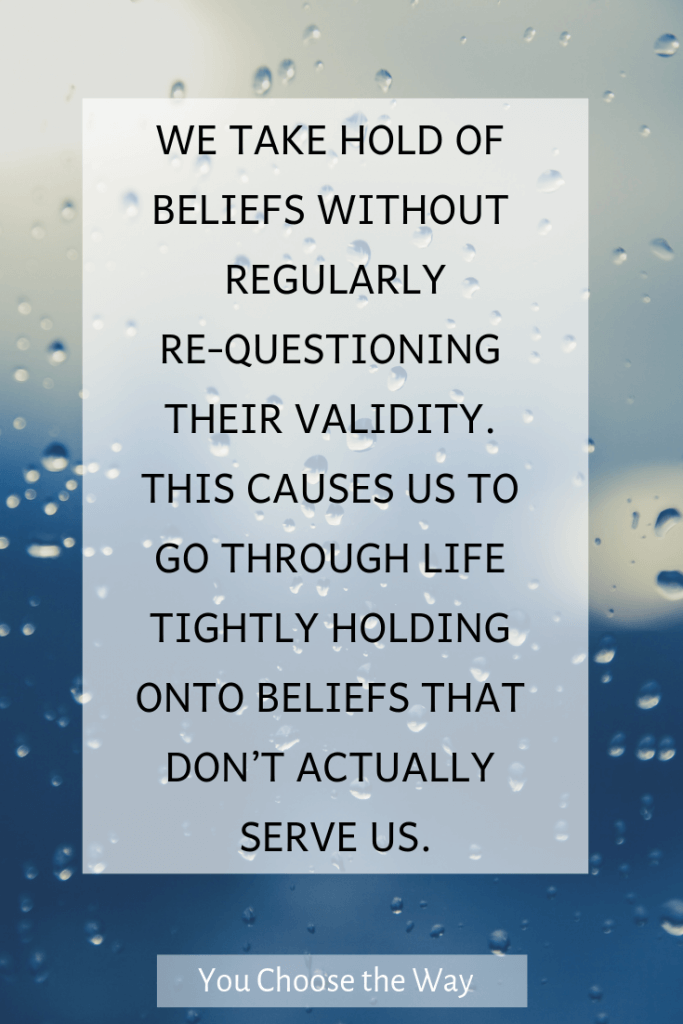As kids, we’re taught what’s right and wrong. From there, we develop ideologies, beliefs, and firm definitions about what are good and bad ways to do things. Then, we casually slid into adulthood without ever questioning the teachings we got as kids. And worst, we grip tightly to those beliefs and are willing to duke it out with anyone who says otherwise.
To better understand why we hold onto some beliefs so tightly, we’ll start by detouring into the wild world of identities. By better understanding the way we define who we are, we’ll start to better understand our obsession with clinging on to certain ideas or words.

Defining I
Answer the question: “Who am I?”
Seriously, take a minute and think about it. If you can, take a pen and paper out and write yourself up a definition.
You might have mentioned your profession, your marital or family status (wife, mother, etc.) or used facts about where you’re from or where you live.
Or you might have also gone into another direction and mentioned political beliefs, religious groupings or long held principals.
Another course of action might have been using your past or your future dreams to define who you are.
Neither of these are right or wrong. For now, it’s just about seeing the words and ideas you hold near.
Now, let’s take this one step further. Take another few minutes or even better, think about this within the next few days: “What words, ideas or beliefs make up your identity?”
The more than you can seriously take the time to break this down, the more you’ll gain insight from this exercise. For real, sit down and figure this shit out.
Some of these words or ideas will be chosen by you, and some chosen by others, by society, by your parents, by the conditions in which you were raised, etc.
You can include positive and negative ideas about:
- Things you like/don’t like to do
- Personality traits
- Strengths and weaknesses
- Ways of seeing the world
- Physical traits: race, clothes style, expressions…
- Titles: marital and family status, citizenship, residency, job, education…
- Interest, hobbies, passions and things you care about
- Or any other characteristic that clarifies who you think you are
What’s the point of this definition?
Again, it’s not about the words being right or wrong, instead, it’s about becoming better acquainted with the words, beliefs, and ideas we use to define who we are
Because it’s these beliefs that we’ll take extremely personally when someone
says otherwise. As we use these words to define the core of who we really are, it’s easy to get all in a huff when words or actions others take go against that. It’s not just about having different viewpoints, but that their viewpoints take a
direct stab at the person you are.
Think about it. What type of content do you post on social media? I bet it’s usually quite in line with the type of person you see yourself as. Maybe it’s super political, or all about the ridiculousness of not vaccinating your kids. Or it’s endless posts about the beauty of traveling the world.
Now imagine how you feel if someone in your feed writes a comment opposing these ideas. How do you feel? How do you respond?
Whether you engage in a full fledge online war or opt to just block them, I bet inside yourself, their comment made you feel uncomfortable. Maybe it crossed your mind that this person must be an idiot. Or that they are ignorant, and must be taught the right way to think. Or maybe it made you feel shit about yourself or insecure.
This happens to me when I see people posting about how global warming is a lie. I’m so sure that my ideas about environmental protection are “the right ones” and that whoever is posting anything that says otherwise must be a fool.
This happens because my Jo-identity has become strongly tied to beliefs about the need to protect our planets natural resources.
The suffering caused by these beliefs
Confronting the world with 100% sureness of the validity of our ideas hurts us in two main ways.
First, it causes us pain when people suggest ideas that are in conflict with our beliefs, because like I mentioned above, we use these ideas to define us.
For example, imagine you strongly consider yourself to be a radically generous person, yet somebody casually mentions one day a story where you are portrayed as a Scrooge. Because this word “generous” has become tightly wound with who you think you are, this casual comment might cause some inner distress.
Another example might be when someone drops a remark about how much they love guns, which goes completely against your beliefs. Their “incorrect” way of looking at the situation will probably sit uncomfortably within you. And I bet, if you found the source of that discomfort, it would be due to how right you know you are about this (as being anti-guns is part of your identity).
This circumstance might even cause you to engage in unhelpful debate.
- Neither one is listening to the other. Each person is so interested in proving their rightness that they spend the entire time the other person is talking internally constructing their next point.
- There’s no openness to the other person’s opinion, so no understanding of why they think what they do.
- There’s no space to internally question, doubt and replant new ideas because the ego has taken the hold of the necessity to be right.
I’m not by any means a gun gal, but I do think that the best way to approach these types of tough conversations, is by being willing to understand where the other person is coming from.
And to do that, we have to be able to take our egos off the table. We need to be able to disconnect from the debate being personal (our need to be right and our identity being safe), and instead engage in debates where we are genuinely interested in listening and understanding.
Second source of suffering from beliefs
We take hold of an idea, a word or a belief without regularly re-questioning its validity. This causes us to go through life tightly holding onto beliefs that don’t actually serve us.
Most of the ideas we have as adults were given to us as kids. And most of us go through life without ever re-checking the soundness of these ideas we were given then.
Do I really believe this? Does this idea serve me? Is it beneficial to me or the world?
This is how racism, sexism, homophobia and all other prejudices still exist today. Billy’s dad told him that blacks were XYZ type of people, and Billy loves his dad and thinks he’s a smart man. So, Billy spends his life assuming that this idea is true.
Or Julia’s teacher told her that girls can’t like other girls because God said it’s bad and against the rules. If Julia never takes the time to think about whether this idea really serves her, guess what Julia will assume for the rest of her life? That being gay is unacceptable. Imagine how internally conflictive that might be if she found herself attracted to women.

Going beyond basic prejudices
This tight grip on our ideas doesn’t only negatively impact our acceptance of others’ life choices, but clutching to these beliefs so tightly is what ends up stinting our of growth and forces us to walk life path’s that don’t suit us.
Some of the ideas we are given as kids might not be racist or sexist, but still block us from being able to soar.
For example, as kids, many of us are given a certain definition of what it means to be successful. Maybe it’s about the type of job one should get or the amount of money that needs to be earned.

But what if those ideas of success don’t flow in line with what you’ve grown to believe as an adult. You might be living your day-to-day to please the ideas you were given as a kid, but deep down inside you feel completely unfulfilled by your existence.
Why?
Because the way that you are living is based on beliefs that no longer serve you. So, you are living incongruently to the values you’ve grown to have for yourself.
And unless you realize that it’s that belief that’s holding you back from quitting your job and embarking on a journey into that artistic path you’ve always wanted to explore, you might never find true joy.

Striving for growth
It’s by individually releasing the tight hold we have about what’s right and what’s wrong that true discussions can start taking place. How can we seriously talk about ending world hunger, gun violence and improving our management of natural resources if everyone is approaching the table inflexible about the best course of action to be taken.
Without opening up our minds, we stay in the past. We create a world with the ideologies given to us by our predecessors. And this is when we as humans, and each one of us as individuals stop evolving.
As it’s in our basic nature to grow and develop ourselves, I’d say that this habit of ours of clinging so tightly to our beliefs is stinting our growth.
What now?
By becoming more aware of the ideas we have and the words and beliefs we use to define ourselves, a large part of the work is done.
Awareness is often times all we need for change to start happening.
It starts with noticing inner discomforts when certain ideas are expressed by others. These are handy cues that what others are saying is touching sensitive, or tightly gripped viewpoints.
Maybe it’s at work when your coworker casually mentions that it’s disrespectful to ask your boss for a raise or maybe it’s when your partner mentions that a house must be cleaned every day.
They say these things, and you notice that something weird happens in you. As though they’ve said something to personally offend you.
Just notice.
From here, the best thing we can do is remind ourselves that what they said has nothing to do with you. They’re simply expressing an opinion. You can choose to react how you’d like about it. But the fact that your ideas about cleaning are different than you partner’s doesn’t mean that either of you are gross slobs or anal perfectionist. It just means that you have different ideas.
And that’s ok. Neither of you are right or wrong.
Face the conversation about how often to clean the house with this mentality. Not only might you be less judgmental and hurtful towards this person that you love, but also, it might help you come up with a cleaning schedule that benefits both of you.

Important clarification about this article
This isn’t about not speaking your truth or engaging in debates. Being vocal and supportive of causes and ideas you believe in is important. It’s about learning to do these things in such a way that most benefits you, the valuable relationships in your life and the world as a whole.
But as with most ideas I write about, first, you need to find ways to be happy and well within yourself, before being able to share that wellness with others.
This concept is no different. Ideally, first, you reduce your own suffering so that you’re then, offering a kick-ass version of yourself to the world.

Interested in reading the article, but don’t have time right now? Pin it here!





